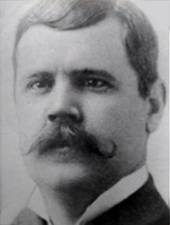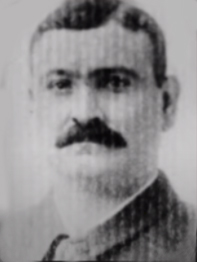

Officers Dolbow and Mullane were shot and killed after responding to an assault call.
On December 8, 1908 at about 4:00 pm, unarmed juvenile court probation officer George Holt was investigating a report of a possible child abduction came upon white-bearded street preacher James Sharp also known as "Adam God," at 5th and Main Streets. Sharp was exhorting a crowd of street loafers and was in the company of a woman and five children from 3 to 14 years of age. Officer Holt's suspicions were reportedly piqued by the manner in which the woman used the children to raise money from the crowd. Officer Holt advised the woman tha the children should be in school. James Sharp struck Officer Holt behind the ear with his pistol resulting in an ugly wound. As the unarmed Officer Holt set out for the police station, Sharp attempted to fire his pistol at Officer Holt but the pistol malfunctioned. Officer Holt reported the incident at the police station and Officers Dolbow and Stege were sent to deal with the situation. As the officers emerged from the station they found that Sharp and the group had moved to a location only a short distance from the station. The officers were not prepared for the volley of bullets that were abruptly fired at them. Officer Dalbow was shot in the chest, abdomen, back and thigh killing him instantly. Lieutenant Stege suffered grazing bullet wound to the chest and a through-and-through wound to his arm reportedly fired by James Sharp's assistant preacher, Louis Pratt, but returned to the fight. Other officers emerged from the station but were hindered in their efforts to return fire for fear of striking bystanders. Officer Mullane was also wounded in the exchange, shot in the right chest, right kidney and right hand. Sergeant Patrick Clark also responded from the station and he was shot in the right chest and stabbed by Sharp in the right eye.
Sharp's companion, Luis Pratt was also wounded in the forehead in the exchange and three times in the leg died at General Hospital two days later. Pratt's wife, Della Pratt, and her two daughters fled to a row boat on the Missouri River. She brandished a shotgun as she attempted to flee and in the resulting gunfire her 13 year-old daughter was struck by a bullet and later died at University Hospital.
A retired farmer, A.J. Selsor, 72, was another casualty of the riot, struck with stray bullet entering his right side and severing his spinal cord. He died of his injuries at midnight on December 10th at University Hospital.
Sergeant Patrick Clark, 42, born in England, emigrated to the United States at 15 years of age. He was married with six children. He had responded from the station without a firearm. He survived his wound but lost his eye. Captain Clark testified against James Sharp on the second day of his trial. Sergeant Clark was promoted to captain for his performance in the Adam God riot, also known as the City Hall riot.
Officer Mullane was taken to St. Joseph's Hospital where he rallied and physicians hoped he would recover. He succumbed to his injuries on December 10, 1908 bringing the death toll of the Adam God riot to five.
Sharp fled and shaved his flowing white beard in a Mulberry Street barbershop. He was apprehended on December 11, 1908 at 4:30 pm by Johnson County Sheriff Steed, who, following a farmer's tip found Sharp hiding in a straw stack on a farm 8 miles northeast of Olathe, Kansas. During the sheriff's questioning Sharp admitted to the shooting. A shotgun and two repeating winchesters, 5 revolvers with boxes of ammunition and a large hunting knife that wounded Sergeant Clark were among the weapons presented at his trial in May 1909. He was tried for his crimes and sentenced to 25 years in prison. He was paroled after 10 years and moved with his wife, Melissa, to Joplin, Missouri in 1924, where he lived as an eccentric street preacher until his death in 1946.
As a result of this tragic loss of life the Board of Police Commissioners reviewed officers access to armament to enable them to respond to an emergency in which they were out-gunned. When it was discovered that officers had difficulty obtaining rifles that were locked up without an easily accessible key they ordered rifles be kept in glass cases in several of the stations and also increased staffing in the stations to provide backup for officers on the beat.
Officer Mullane, born in Limerick, Ireland, had been with the agency since November 1905. He was eulogized by municipal Judge H.G. Kyle as being the ideal policeman. He also distinguished himself prior to his appointment on the department by diving in a pit filled with dangerous, rushing water during the 1903 flood to save a drowning man. He was survived by his wife of ten years, Hannah; his children, Jack, 7, and a 3-month old daughter. Services were at Sacred Heart church. Interred: Mount St. Mary's Cemetery.
Officer Dolbow had been with the agency for three years. He is survived by his wife of seven years and three brothers, George, Henry and Joseph. Interred: Forest Hill Cemetery.
Article by Brent Marchant